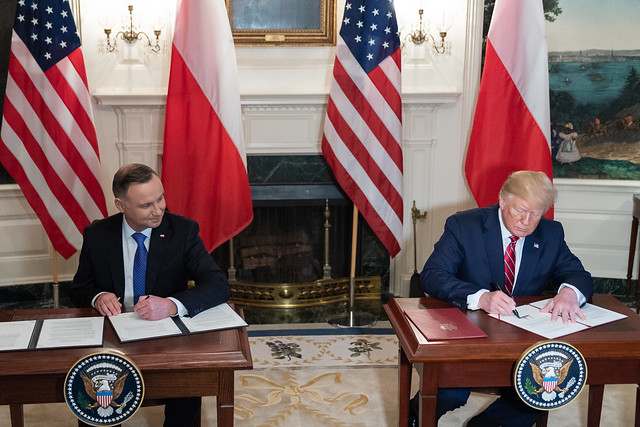W czasie swojej ostatniej wizyty w Stanach Zjednoczonych, Prezydent Andrzej Duda podpisał umowę z Prezydentem USA, Donaldem Trumpem, o zakup trzydziestu dwóch samolotów F-35 oraz zwiększeniu obecności wojskowej USA o tysiąc dodatkowych amerykańskich żołnierzy w Polsce. W swoich planach modernizacyjnych do roku 2026, Polska zamierza wydać około 185 miliardów złotych (48 miliardów dolarów) na nową broń i sprzęt wojskowy. Prezydent Donald Trump wyraził wsparcie USA dla Polski nie tylko w kwestiach obronnych kraju, ale również w sferze energetycznej.
W ramach projektu modernizacji Polski oraz osiągnięcia jej niezależności energetycznej, Prezydent Duda odwiedził gazoport na granicy Teksasu i Luizjany gdzie spotkał się z Sekretarzem ds. Energii Rickiem Perrym. Dwa dni przed tym spotkaniem Stany Zjednoczone podpisały z Polską umowę o zwiększenie sprzedaży amerykańskiego skroplonego gazu ziemnego o 2 miliardy metrów sześciennych o wartości około 8 miliardów dolarów. Prezydent Trump rozumie, że silna i prawdziwie suwerenna Polska to Polska niezależna od rosyjskich zasobów naturalnych, która chroni interesy bezpieczeństwa narodowego Stanów Zjednoczonych i promuje amerykańskie wartości wolności politycznej i swobodnej przedsiębiorczości w Europie Środkowo-Wschodniej.
President Duda visits the US:
The promise of a heightening alliance through increased American presence in Poland
by Patrycja Pajdak
Civilians in or around the DC area may have been shocked to hear two F-35 Marine Corps fighters conduct a flyover of the White House, this past Wednesday, June 12th, 2019. The common restriction on airspace in the nation’s capital since the September 11, 2001 attacks made the sight an absolute marvel and the day one to remember in more ways than one, marking the second visit of Polish President Andrzej Duda to the United States in less than a year. The rare display signified Poland’s promise to purchase 32 F-35 jets from the US and the signing of a new defense agreement that will station 1,000 additional troops in Poland on a rotational basis. There are already 4,500 troops that rotate throughout the country as part of a North Atlantic Treaty Organization (NATO) mission. In an effort to advance the security of its own nation, the Polish government has agreed to bear the cost of this addition, while not altering the total amount of US troops stationed across Europe.
This purchase of jets from the US comes after Polish Defense Minister, Mariusz Blaszczak, wrote a request at the end of May, outlining Poland’s goal of replacing post-Soviet gear in the Polish Air Force with more modern aircraft. In its plans to modernize, Warsaw has established hopes to spend some 185 billion złoty ($48 billion) on new weapons and equipment by 2026. President Duda’s visit to the US reflected this goal, not only in his negotiations with President Trump in Washington, D.C., but in his other US stops from Houston, Texas, where he signed a cooperation agreement on new technologies in cancer treatment, Louisiana where he met Energy Secretary Rick Perry at a liquid natural gas facility, and Reno, Nevada, where he observed demonstrations of drone testing led by the Nevada Institute of Autonomous Systems.
President Trump has been an adamant supporter of Poland’s initiatives and though he has not directly referred to recent agreements with Poland as a means of deterring Kremlin aggression, measures taken will certainly strengthen Poland’s sovereignty and defense while bolstering a US-Poland military relationship. Poland has been aiming for a US military base since Kremlin capture of Crimea in 2014. There has been talk of a potential US base dubbed “Fort Trump” within the country, however, nothing has been finalized yet. The two countries certainly share a history of common efforts and to the satisfaction of President Donald Trump, Poland is one of the few NATO countries that spends at least 2 percent of GDP on defense, while still looking to expand contribution. The US-Polish alliance has promise of reaching extraordinary heights in 2019.

President Andrzej Duda and President Donald J. Trump agree to increased American presence in Poland. Image Source: https://www.defense.gov/explore/story/Article/1874143/us-polish-leaders-agree-to-increased-american-presence-in-poland/
President Trump has already expressed support to Poland on its road to energy independence, specifically in the construction of the Baltic pipeline. During President Duda’s visit, the US signed away 2 billion cubic meters of US liquified natural gas, worth approximately $8 billion, to Poland. The countries also agreed to civil nuclear cooperation, likely to advance Poland’s energy security. These agreements all prove to be beneficial to the Three Seas Initiative, launched in 2015 by Croatian President Kolinda Grabar-Kitarović and Polish President Andrzej Duda to promote connectivity, as well as peace and prosperity, in Central and Eastern Europe. Supporting this initiative and strengthening Poland, a key ally, is a win-win situation for the United States, however, can only be further attained by binding the country to the rest of Europe and the West, away from dependence on Russia’s state-owned giant Gazprom that provides roughly half of Poland’s imports of natural gas. A strong and truly sovereign Poland that is independent of Russian natural resources protects United States national security interests, and promotes American values of political freedom and free enterprise in East Central Europe. The negotiations achieved during President Duda’s visit are only the beginning for a brighter future for Poland.
Are you interested in funding an issue advocacy effort to move Fort Trump from rhetoric to reality? Join the cause with PAC by clicking…
